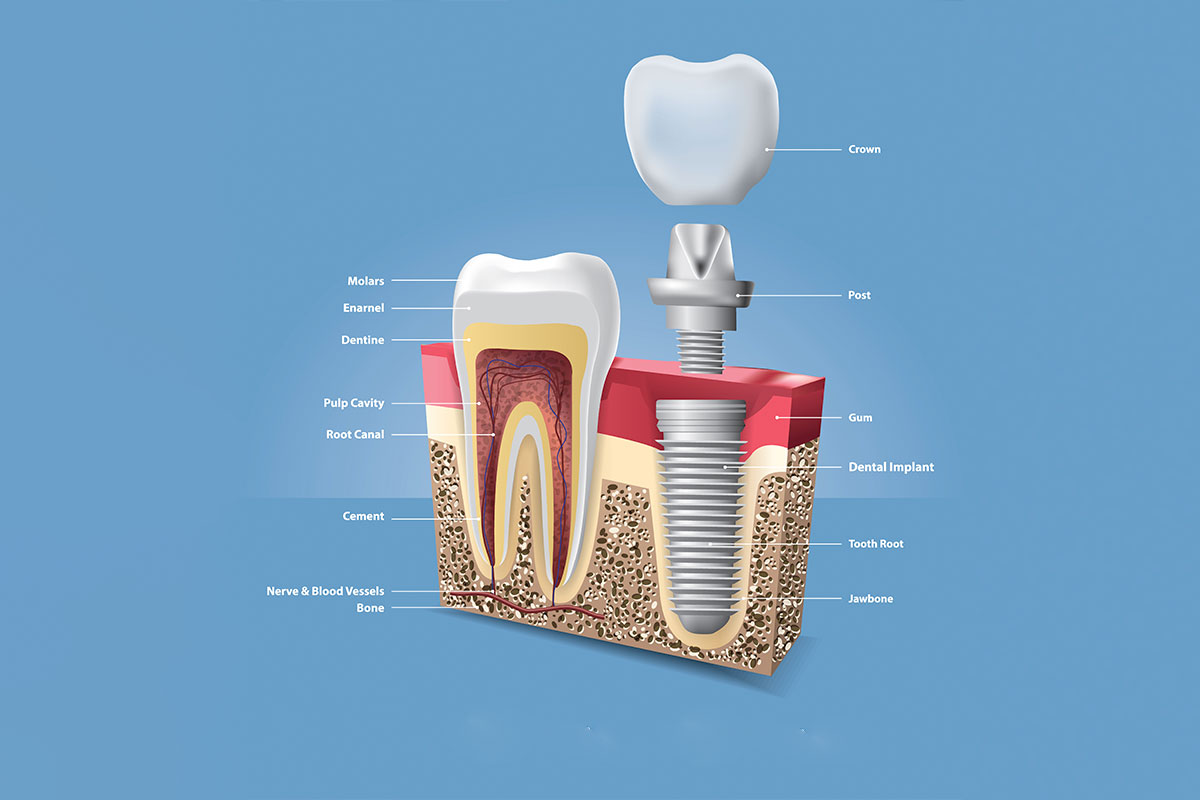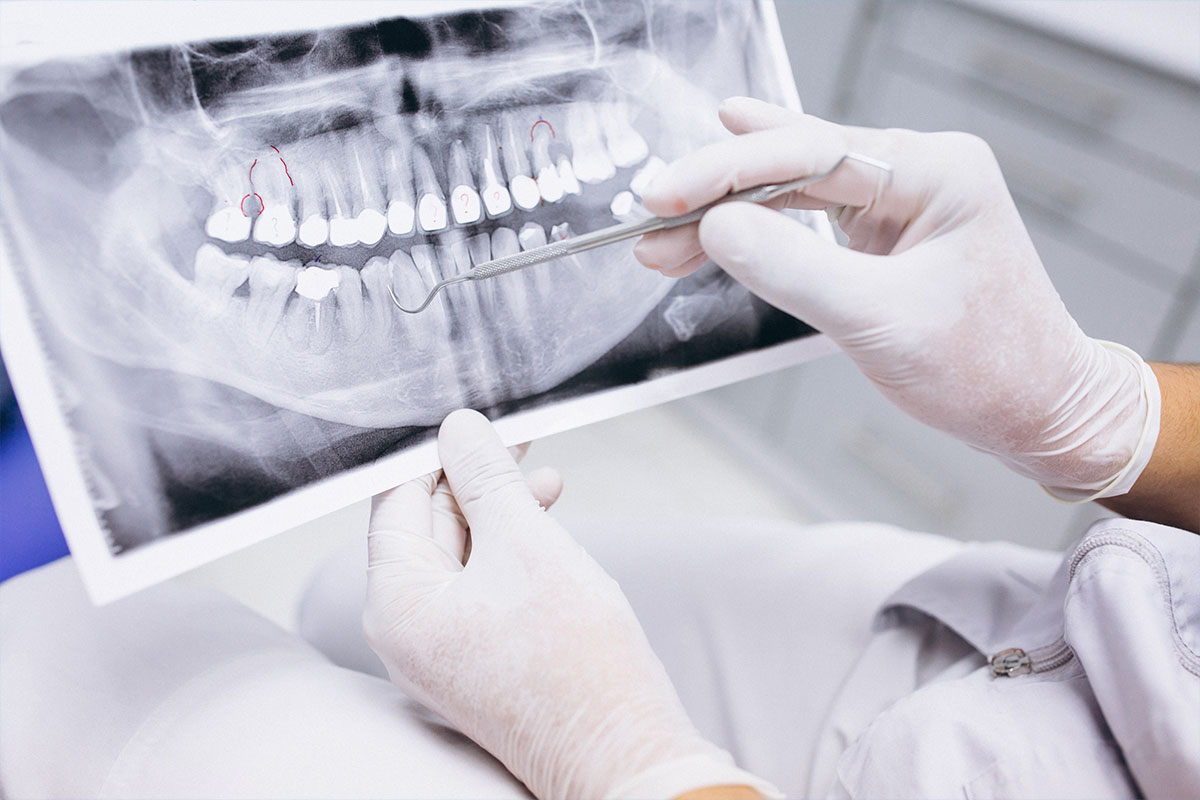An implant, in dentistry, refers to a surgical component that is placed into the jawbone or the soft tissue of the mouth to support a dental prosthesis, such as a crown, bridge, or denture. Dental implants are typically made of titanium or a titanium alloy and are designed to fuse with the surrounding bone, providing a stable and durable foundation for replacement teeth.
Dental implants are a popular treatment option for people who have lost one or more teeth due to injury, decay, or gum disease. They offer a long-term solution for replacing missing teeth that can improve the appearance and function of the mouth, as well as promote overall oral health.
The implant placement process involves several stages, including a consultation and evaluation, implant placement surgery, and a period of healing and integration before the prosthetic teeth can be attached to the implant. The entire process can take several months to complete, but the result is a permanent and natural-looking replacement for missing teeth that can last a lifetime with proper care.

Who can have dental implants?
Initial consultation
During this stage, the dentist will evaluate the patient’s dental health, including the condition of the teeth and gums, as well as the density and quality of the jawbone. The dentist may also take x-rays or other diagnostic images to help plan the treatment.
Implant placement
Once the patient is deemed a good candidate for dental implants, the dentist will perform a surgical procedure to place the implant into the jawbone. This involves making an incision in the gum tissue, drilling a hole in the jawbone, and placing the implant into the hole. The implant is then covered with a protective cap or stitch and allowed to heal for several months.
Osseointegration
This is the process by which the implant fuses with the jawbone, providing a stable foundation for the replacement tooth. During this stage, the patient may be fitted with a temporary crown or bridge to protect the implant and maintain the appearance of the smile.
Abutment placement
Once the implant has fully integrated with the jawbone, the dentist will perform a second surgical procedure to attach a small metal post called an abutment to the implant. This post will serve as the support for the replacement tooth.
Replacement tooth placement
Finally, the replacement tooth or teeth (such as a crown, bridge, or denture) are attached to the abutment. The replacement teeth are custom-designed to match the shape, size, and color of the patient’s natural teeth, providing a seamless and natural-looking smile.
Overall, the implant dental treatment process can take several months to complete, depending on the patient’s individual needs and the complexity of the treatment. However, the result is a permanent and highly functional solution for missing or damaged teeth that can provide many years of reliable use.

What Should Be Considered After Implant Dental Surgery?
After implant dental surgery, it’s important to take proper care of the implant site to ensure proper healing and prevent complications. Here are some things to consider:
Pain management
It’s normal to experience some pain and discomfort after implant dental surgery. Your dentist may prescribe pain medications or recommend over-the-counter pain relievers to help manage any discomfort.
Oral hygiene
Good oral hygiene is critical for preventing infection and promoting healing after implant dental surgery. You may need to avoid brushing or flossing around the implant site for a few days after surgery, but you should continue to brush and floss the rest of your teeth to keep your mouth clean.
Diet
You may need to stick to a soft or liquid diet for the first few days after surgery. Avoid hot, spicy, or crunchy foods that can irritate the implant site. As the healing progresses, you can gradually reintroduce solid foods into your diet.
Rest
It’s important to rest and avoid strenuous physical activity for a few days after implant dental surgery. This can help reduce swelling and promote healing.
Follow-up appointments
Your dentist will schedule follow-up appointments to check the progress of the implant and ensure that it is healing properly. Be sure to attend all scheduled appointments and follow your dentist’s instructions for care and maintenance of the implant.
By following these guidelines and taking good care of your implant site, you can help ensure a successful outcome and enjoy the benefits of a restored smile for years to come.

What are the complications that may occur after the implant application?
While implant dental surgery is generally safe and successful, there are some potential complications that can occur. These include:
Infection
Infection is a common complication after any type of surgery, including implant dental surgery. Signs of infection include fever, swelling, redness, and tenderness around the implant site.
Implant failure
In some cases, the implant may not integrate properly with the jawbone, leading to implant failure. This can be caused by a number of factors, such as poor bone density or improper placement of the implant.
Nerve damage
The implant surgery involves placing the implant in close proximity to nerves in the jaw and face. In rare cases, nerve damage can occur, causing numbness, tingling, or pain in the face, tongue, or lips.
Peri-implantitis
This is a type of gum disease that can occur around the implant site. It is caused by bacteria that infect the gums and can lead to inflammation, swelling, and bone loss around the implant.
Allergic reactions
Some patients may have an allergic reaction to the implant material or other materials used during the surgery, such as anesthesia or sutures.
It’s important to keep in mind that these complications are rare, and most patients experience a successful outcome after implant dental surgery. However, if you experience any unusual symptoms or complications after surgery, be sure to contact your dentist immediately for further evaluation and treatment.

How Long Do Implants Last?
Dental implants are designed to be a long-lasting and durable solution for missing or damaged teeth. With proper care and maintenance, dental implants can last for many years, even a lifetime. In fact, the success rate for dental implants is very high, with up to 98% of implants lasting for 10 years or more.
The longevity of dental implants depends on a number of factors, including the patient’s oral health, the quality of the implant material, and the skill of the dentist who performs the surgery. Additionally, patients must take proper care of their implants to ensure their longevity. This includes regular brushing, flossing, and dental checkups, as well as avoiding damaging habits like smoking or chewing on hard objects.
While dental implants are a more costly option than other tooth replacement options like dentures or bridges, their longevity and durability make them a cost-effective solution in the long run. Ultimately, the lifespan of dental implants will depend on individual circumstances, but with proper care and maintenance, they can provide a reliable and permanent solution for missing or damaged teeth.

